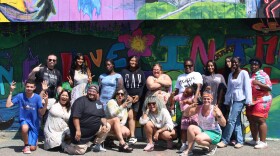Award-winning poet and New Hampshire native Wesley McNair was born in Newport, grew up in the Connecticut River Valley, and has lived for many years in Mercer, Maine, the state for which he has been named Poet Laureate. Drawing from his personal experiences, McNair's poetry is emblematic of both family and economic hardships, and New England living. McNair has authored several collections of poetry, prose, and has edited several anthologies of Maine writing. McNair recently published his nineteenth book, The Words I Chose, a memoir describing his journey to becoming a poet amidst growing up in a broken home, poverty, and the hardships of family life.
Watch Poet Laureate Wesley McNair on PBS.
TRANSCRIPT
WESLEY MCNAIR: My father, during my childhood, was around and not around. By the time I was seven, he had met another woman, and he abruptly left the family, which consisted then of my mother, my two brothers, and me, and he just never came back. I learned later that he went off to start a family in Chicago. But in this period, nobody knew where he went. There was no child support. My mother, who had no professional certificate of any kind, but was a pretty good seamstress, began to take in sewing from people in the neighborhood and also from local stores, in Springfield and then, later on, Claremont. At a certain point after my father’s departure, I sat down and drew a wanted poster, and I drew his face in the center of the poster. Of course at the bottom of the poster I wrote the word “Wanted.” As I look back on it, that word “Wanted” seems to me my first poem, because it shifted between meanings. He was wanted; he was accused, on the one hand. So when I showed the poster to my mother, he was a bad guy with whiskers. But at the same time, I was telling her that I missed my father and wanted him around. So by the act of writing that word, in the context of the poster, I came to poetry, I think, because I negotiated between the two of them. Eventually, my mother divorced my father – this was in 1949 – and finally married my stepfather, whom she met, I think, in that same year. My stepfather moved us to a tract of land, 13 acres, in West Claremont, and began building a garage, which we lived in for many years, actually, while he got the wherewithal to start a house. So this garage was probably one of the most forlorn family homes in existence. I think I learned – for the sake of survival, I learned how to distance myself and I learned that by the quality of my observations, by paying attention, perhaps the more secure I felt. I was present. But I was also a little bit like, over time perhaps, a little bit like an extra-terrestrial observing from a sufficient distance that would allow me to assimilate it and understand it in a different way. Though no doubt my becoming a poet was in the blood somehow, it might have been this experience that nudged me in a special way toward the kind of observation that is important for a poet to have. There is a writer named Ross McDonald, who once wrote the most interesting definition of a writer I’ve ever read. He said: Verbal artist, a person who suffers in childhood or youth what he calls a shock, crippling, or injury. Some serious and painful dislocation, that is, that sets him or her, one removed from the world so that writing becomes a way of reclaiming the world. I don’t insist on this as a profile for all writers, but it works for my writer friends and many of my artist friends, as well. You know, this sense, whether you know it or not, of a wound that you’re somehow driven to heal. I think that poets are menders of broken things. There’s a song called “Anthem,” by Leonard Cohen, which has the refrain, “There is a crack in everything. That’s how the light gets in.” The light, in this case, being the insight and illumination of your creative work. I wouldn’t necessarily recommend my childhood to everybody, especially this event in it, but on the other hand, sometimes from this long perspective of having made poems all my life, I look back and see it as a kind of gift, because it ushered me into my life as a poet.








